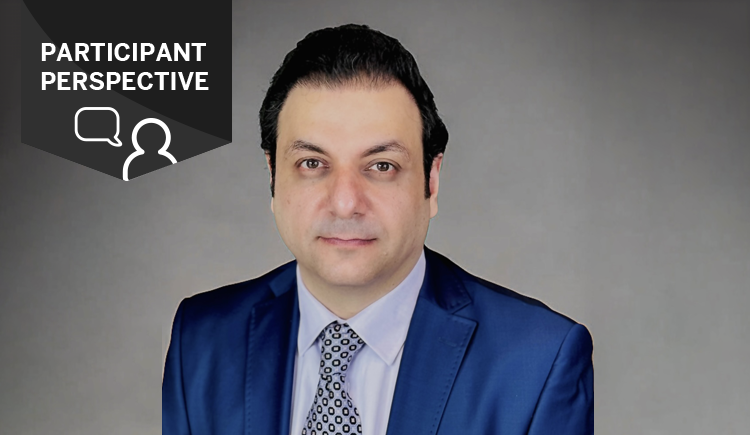
Information regarding COVID-19 has rapidly evolved. The content in this article provides a historical snapshot of events surrounding the date of posting.
It is no surprise that the COVID-19 pandemic has genuinely challenged and strained the health care system. With many losses, challenges, and tragedies associated with the disease, Ted James, MD, MHCM, FACS, associate professor at Harvard Medical School, shares how leaders can help their organizations navigate beyond this global health crisis. The following article is an excerpt from this discussion recorded on June 18, 2020 that has been condensed and edited for clarity and accuracy.
Opportunities for Change
We all recognize that the COVID-19 pandemic is responsible for numerous hardships and tragedies. However, it has also presented opportunities for lasting and meaningful improvements to the health care delivery system. Clinicians and other health care professionals are well-positioned to enact change. As leaders, it is necessary to respond to the challenges and the opportunities that COVID-19 has created, notes Dr. James.
While it’s unlikely that circumstances will return to ‘normal,’ this is not necessarily negative. There is an opportunity for health care professionals to define the future of health care. We have the chance to examine the current health system and to implement lasting solutions to current issues.
We can focus on addressing inefficiencies and disparities in patient care, reducing provider stress, and enhancing access through virtual and digital care. As Dr. James explains, regardless of other clinical metrics, the key to excellence in health care is to improve value for patients.
Climate for Change
Leaders must create a climate for change. A common error that Dr. James observes is that people become very engaged in leading change, but they don't prepare their environment and the people who are around them for that change.
In creating this environment, it is necessary to begin any change process with a clearly defined purpose. People need to understand why change is required in order to be motivated. An excellent example of this concept is provided in a TED Talk by Simon Sinek called Start with Why: How Great Leaders Inspire Action. His premise is that people don't buy into ‘what’ you do. They buy into ‘why’ you do it.
Sinek uses Dr. Martin Luther King Jr.’s “I Have A Dream” speech to illustrate the point. He describes how King gives his audience a vision of a better future. This dream serves as the ‘why’ and is a vision that inspires action and support. It’s important to communicate the vision to help people understand the reasoning behind the change.
Secondly, leaders preparing a climate of change need to embrace inclusion. People are receptive to change when you include them in the process, show them respect, and ask for their ideas.
“I always find that when I'm more inclusive and bring a diversity of ideas, the end product is always much richer than anything I would have come up with on my own," said Dr. James.
Incorporate Psychological Safety
Psychological safety is an integral part of building a climate that is ready for change. Psychological safety is critical when asking people to do things differently, especially in health care. The stakes are so high. No one wants to make a mistake and harm patients. Change initiatives fail when people are confused and feel unsafe.
We need to create areas where people feel safe, not just safe to contribute, but to become agents of change. It needs to be safe to speak up, share ideas, experiment, and try new things, safe to fail in a way that doesn't harm patients. It is also important to ask those who are not contributing to share their ideas and thoughts.
For change to happen, people must be within a safe culture and environment.
Data is an Essential, Powerful Tool
Data allows for clarifying issues objectively. It allows for a common understanding of the scope of a problem. It also provides a good start and endpoints and allows for monitoring progress.
With appropriate metrics in place, you can detect early wins, which help with team motivation. Equally important, monitoring the change initiative with data provides the ability to detect a lack of progress. Frequently, when using the right metrics, problems with process can be identified before detrimental clinical outcomes.
Using metrics creates a means of accountability. It allows for identifying high-performing areas or best practices, skills that we want to replicate and teach others to do. It also allows you to identify areas or people who are struggling with the change process and need extra help or additional resources.
Build Teams
Transformational change is rarely achieved in isolated silos. Creating collaboration across the organization is critical. We benefit from working with others beyond our departments and forming teams among various health professions. Incorporating different ideas is a core principle for implementing successful change.
Open lines of communication throughout the entire health care system are necessary. We need to be listening and learning from others as much as we try to convey information.
Mutual support is another crucial element. It is important to understand how others work and how some of the change initiatives that we are planning will impact their processes.
We also need to be comprehensive when we think about team composition, and include our patients, as they are a critical part of the care team.
A Healthier Future
We are experiencing an atypical time in health care and a rare occasion to build a better health care system. There are opportunities to improve care dramatically and to meet patient demand in new ways.
Every clinician has ideas and valuable insights that can radically reshape health care. To get started, Dr. James recommends determining one small step you can take to make things better. Then, create a reasonable timeline for completion. Doing so makes the plan real, tangible and increases the likelihood of accomplishing the goal.
“I truly believe that by embracing the responsibility to lead change and by applying even a few of the principles that we spoke about today, that we, in health care, can emerge from this crisis, emerge from this entire time much better and much stronger than we've ever been. I believe we can become better as individuals. We can leave a better health care system as our legacy,” said Dr. James.


